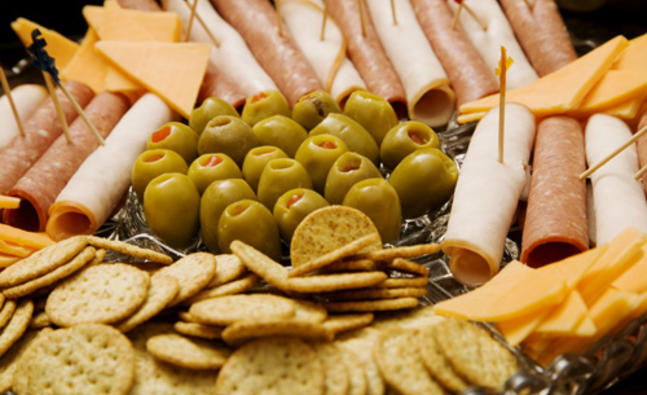Best Diets of 2014
Every year, U.S. News & World Report names the top diets of the upcoming year—and the results for 2014 are in! To determine the winners in each category, U.S. News enlisted a panel of health experts to assess the latest diet trends. This time around, many of the plans on the list are pretty new (a.k.a., you may not have heard of them), so we figured we'd fill you in on the details:
The Flexitarian Diet
How it works: The term "flexitarian" is a combo of two words: flexible and vegetarian. Basically, you're a vegetarian with wiggle room—if you have a craving for a burger every so often, you're free to chow down. Flexitarians focus on five basic good groups: protein (mostly tofu, beans, lentils, etc.), dairy, fruits and veggies, whole grains, and sugar and spice. Each day, you're supposed to follow a 3-4-5 plan: 300 calories for breakfast, 400 for lunch, 500 for dinner, plus two 150-calorie snacks.
Why people like it: The name speaks for itself! It's very flexible. This diet is best for people who like to have an idea of what to do but don't like having too many rigid rules to stick to.
MORE: How to Become a Part-Time Vegan
The Eco-Atkins Diet
How it works: Similar to the regular Atkins diet, this one is also low-carb—but it doesn't eliminate carbs entirely, and it's way more plant-based. Instead of loading up on fatty, cholesterol-loaded meats and cheeses, you eat 31 percent of your calories from plant proteins, 43 percent of them from plant fats, and the remaining 26 percent from "good" carbs. Most people on this plan are vegan, but some still eat fish, lean white meat, and dairy products.
Why people like it: It's much better for your heart than the traditional Atkins diet since you're not eating tons of cholesterol. That said, it's harder than some other diets to maintain because it's more restrictive (you're not supposed to have any red meat or "bad" carbs like white bread and pastries). So if you randomly have a craving for a Pop-Tart, you're out of luck.
MORE: 5 Easy Ways to Start Losing Weight NOW
Raw Food Diet
How it works: You eat only raw food, which hasn't been cooked, processed, microwaved, genetically engineered, or exposed to pesticides or herbicides—and it's never heated above 115 ° F. The theory is that cooking food kills most of the vitamins in it, so by eating it raw, you're taking in more nutrients. Most people who follow this diet are vegan, but some eat raw animal products, like raw fish, cheese made from raw milk, and certain kids of raw meat. You typically end up losing weight—research suggests that people who follow this plan end up eating fewer calories overall since there are so many things they can't eat and you have to plan out pretty much everything you put in your moth (i.e., it's harder to randomly grab a snack without thinking about it).
Why people like it: It's trendy, for one thing, and also, proponents say they feel fresher and more of-the-earth when they eat raw. Thing is, it's not terribly convenient. Raw food restaurants, while growing in popularity in urban areas, are still pretty rare nationwide. And meal prep can take a while, too (lots of juicing, blending, and dehydrating is involved).
The Volumetrics Plan
How it works: This isn't so much a diet plan as a general way of eating. It was developed by Barbara Rolls, a nutrition professor at Penn State University, and it's based on the assumption that people tend to eat the same amount of food each day, regardless of how many calories are in said food. Rolls hypothesized that if you fill your plate with more low-cal foods, like veggies, you'll end up taking in fewer calories without actually eating less food. And it turns out, she was right.
Why people like it: You don't feel like you're starving yourself because you're still eating the same amount of food as you were when you weren't on the plan. Plus, it doesn't ban or limit any specific food groups, so you're more likely to stick with it.
MORE: Diet Dictionary
-
Mindfulness could help you slim down
-
Stand up and burn calories
-
I Dropped 50 Pounds and Became Addicted to Running
Before: 189 After: 137 The Lifestyle As a kid, I was always really ac
-
How I Finally Stopped Yo-Yo Dieting and Lost Almost 90 Pounds
Before: 216 After: 130 The Lifestyle Even though I played sports thro
-
Maximise calorie burnout
-
I lost 57kg with TLC for Weight-Loss
- DON'T MISS
- How too little sleep can cause weight gain
- Something fishy for breakfast
- Quick tips for WEIGHT LOSS: Tummy rumbles
- Burn calories toning your calves
- 6 Ways cut your food bill, eat healthy AND lose weight!
- The Secret Ingredient That Kills Cravings
- Does Drinking Lemon Juice Help You Lose Weight?
- What Annoys Olivia Munn About Weight-Loss Talk
- Gaining weight at the movies
- The WORST take-away meals to order if you’re on a diet & what to get instead




